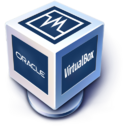VirtualBox

| |
| Developer(s) | Oracle Corporation |
|---|---|
| Latest version | 7.0.14 [+] |
| Active | Yes |
| Platform(s) | Windows macOS Linux Solaris |
| Architecture(s) | x86-64 |
| Type | Hypervisor |
| Website | virtualbox.org |
| License | Open-source |
Oracle VM VirtualBox (also known simply as VirtualBox) is a virtualization software and hypervisor developed by Oracle Corporation. Originally produced by Innotek in 2006, which was acquired by Sun Microsystems Inc., which, in turn, was acquired by Oracle Corporation. It's released for Windows, macOS, Linux and BSD. It has support for a wide range of guest operating systems such as Windows, macOS, Linux, BSD, MS-DOS, OS/2 etc., thus even being able to play games made for these platforms. However, its Video RAM (VRAM) limit is 128 MBs, and with 2D hardware acceleration, 256 MBs. So, today's video games made for Microsoft Windows, macOS, Linux may not work smoothly. It's better to use alternatives such as VMware Workstation and QEMU to play these games made for those platforms.
VirtualBox allows one to install "Guest Additions" onto the VM. Among the features added by this are Shared Folders (making it much easier to move files back and forth) and hardware acceleration of 3D (OpenGL and Direct3D 8/9) and 2D graphics. However, 3D acceleration and 2D acceleration require the guest to be at least Windows 2000 or Windows XP respectively, and there is no support for even installing the Guest Additions on a Windows 9x guest. Later Windows 9x games thus may be extremely slow or not work at all, and you are better off using 86Box for these, or using a Compatibility layer to try to force them to work on modern Windows. Due to changes in VirtualBox's 3D acceleration system, you must use VirtualBox 6.0.24 or earlier to use 3D acceleration in a Windows XP or Vista guest.
Download[edit]
| Official releases |